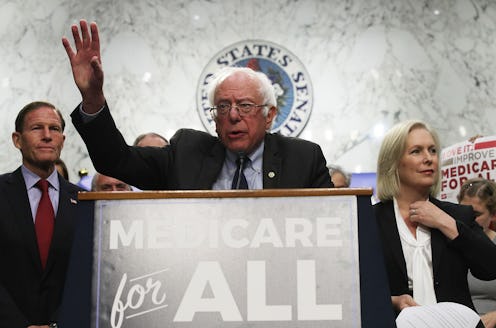News
The One Thing To Know About Bernie Sanders’ Sweeping Medicare-For-All Plan

On Wednesday, Senator Bernie Sanders held a press conference announcing his proposal for a "Medicare-For-All" health care plan. Under the Sanders bill, all Americans would be transitioned away from private insurance to a government health program, similar in some ways (but less than the title implies) to Medicare. It's an ambitious proposal, which would cost trillions of dollars, hasn't been fully fleshed out in detail, and, of course, has no chance of passing the Republican Congress with a Republican president. But the most important thing about Bernie Sanders' Medicare-For-All plan has less to do with the details of the plan itself than with the Democratic senators flanking him as he rolled it out.
Back in 2013, Senator Sanders proposed a government health care bill, and he did so alone. But after his 2016 election campaign, where he did surprisingly well running on a Medicare-For-All platform, Sanders' view of health care has become popular among Democratic voters, and by extension, Democratic leaders. In the days leading right up to Sanders announcement, senator after senator announced that they would be joining him in sponsoring the bill, including such top Democrats as Kirsten Gillibrand (D-NY), Cory Booker (D-NJ), and Elizabeth Warren (D-MA). In the past two years, Bernie has transformed the Democratic party on this issue.
Sanders knows that this bill will not pass in this Congress. And he probably even expects that this bill specifically won't make it through Congress even if there was Democratic control of both houses as well as the White House. What this bill represents is a statement of principles — Democrats want to ensure that all Americans have health care that they can afford and want the government to guarantee it.
The details of how they do that will come later. Perhaps Democrats really will go as far as Sanders' extremely expansive (and extremely expensive) Medicare-For-All bill. But probably not. Chances are the actual policy Democrats will pursue will include a smoother transition from the current system to this dream system, or slightly less generous benefits (this bill covers dental and vision, and doesn't cost patients anything, meaning it's an even more comprehensive single-payer insurance plan than any other country provides). Or perhaps it will preserve some role for non-governmental insurance. But so many Democrats joining in with Sanders in announcing their desire for government-guaranteed universal health care means that the argument will now be not about if Democrats pursue universal health care, but how they intend to achieve it.
It matters that several of the people standing next to Senator Sanders (and potentially Sanders himself) are likely presidential contenders in 2020. With Booker, Kamala Harris (D-CA), and Gillibrand all joining in supporting the bill, there's no way it won't become a dominant conversation in the 2020 Democratic primary. Chances are, Democrats will have actually figured out what proposal makes sense by then, whether they decide to promote something like France's multi-payer system, Switzerland's more aggressive Obamacare-like system, or Bernie's full government takeover of all costs. Regardless, the the party will be pursuing these ideas leading up to primary debates and elections. But Sanders' press conference on Wednesday clarified what questions will be asked.
Perhaps not all candidates who want to run for president in 2020 will need a single payer plan. But even those who don't will need an answer to this question. You can see it in how Sherrod Brown (D-OH), who is running for reelection in a year in a state Trump won, responds to the proposal. The normally progressive senator probably can't advocate as far left as his friend Bernie would when he's trying to win in a more conservative state, but even he supports lowering the Medicare age to 55, a measure that some single payer advocates see as the first step in pushing towards their goals.
In the months since the Democrats lost the White House, they've often been at a loss to explain to voters what they stand for. But with Wednesday's press conference, they've made one thing clear — the Democrats are the party of expanding government health benefits. After the fiasco that was the Republicans' attempts to repeal the Affordable Care Act in the first few months of the Trump administration, it's a message that Democrats seem to eagerly want to pursue, not just in 2020, but even sooner in 2018.